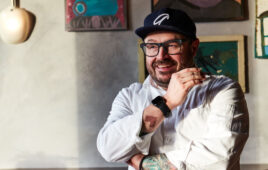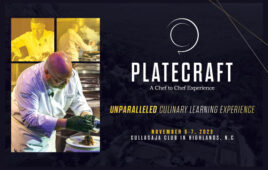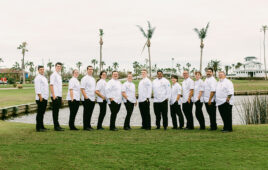|
Kirk Deloach, CEC
CHEF PROFILE
|
Executive Chef Kirk Deloach draws on his global culinary experience to enhance Biltmore Estates CC’s rich traditions.
From the earliest days of the Roaring Twenties, Biltmore Forest Country Club (BFCC) has played a significant role in the social history of not only Asheville, N.C., but all of the Carolinas. Mrs. Edith Vanderbilt, widow of George W. Vanderbilt, was instrumental in acquiring the land for the town of Biltmore Forest from the family estate in 1920. Included were plans for a country club, which eventually featured a Donald Ross-designed golf course and opened in 1922. In the years between the world wars, BFCC’S magnificent settings and superb views attracted celebrities and leaders such as Bobby Jones, Bill Tilden, General “Black Jack” Pershing, John D. Rockefeller, William Jennings Bryan, and Presidents Taft and Coolidge.
Kirk Deloach, CEC, has been at the controls of the BFCC kitchen since 2007. Drawing on a wealth of varied experience both from distinguished private clubs and his truly global culinary training ground (see Chef Profile box), Chef Deloach has raised the level of cuisine in the newly renovated BFCC clubhouse. He was generous with his time to discuss how he makes, and keeps, the 760 members of this exclusive Platinum Club so happy.
Q Chef, after working in so many different parts of the world, what experiences have been imbedded in your cooking style from the time you spent overseas, in addition to U.S. clubs and restaurants?
A The one compelling common ingredient I found when working overseas is a passion for cooking. And then each area adds its own distinctive twist.
In Japan, the attention to detail is amazing; they have a work ethic like no other country I’ve been in. Australia stands out for the insistence on fresh ingredients. It is still somewhat “Old World” to me, with some of the most beautiful open markets I’ve ever seen; the butcher shops and fish mongers are incredible. In Morocco, not only do they prepare some incredible dishes, but the joy and skill with which they do it is highly contagious. So overall, what experiences have been embedded in my cooking style? Pay attention to detail, have a strong work ethic, insist on fresh local ingredients, and enjoy what you’re doing.
 |
| Cornelia Vanderbilt drove the first ball on the Donald Ross-designed course when BFCC opened in 1922. |
Q You are adamant that ethnic foods shouldn’t just be put on menus to fill space. Can you give some examples of how you integrate these menu items in an authentic way?
A It’s just my opinion, but I feel that classic ethnic dishes should not be bastardized. These dishes have strong cultural and historic values to the people who make them, and I feel we should show them respect by reproducing them as accurately as possible. In my kitchen, we do the research beforehand on any ethnic dishes we’re attempting to make. We use the proper ingredients, the proper cooking techniques, and the proper equipment—or we don’t do it.
Because some ethnic dishes are so far off the flavor profile we’ve created on our everyday menus, we tend to use them mostly for special occasions in banquets, member events, and wine dinners. I’m not saying to stop trying new things or new combinations of cuisines—but when you do, make sure you are not disrespecting the history and tradition of the dish.
Q You have a pastry shop built into your brand-new kitchen. What’s the membership’s perception of your home-baked products?
A We are very fortunate to have a bake shop and a very talented pastry chef. Our members have come to expect and appreciate the high quality of our baked products—cookies, pastries, breads and a la carte desserts are now made in-house. It is also very convenient for the membership to be able to talk directly with the pastry chef to accommodate their requests for any special occasions. There are many fine pastry products in the marketplace, but I feel being able to control the quality, quantity and integrity of the products we make is of utmost importance.
Q Chef, can you describe your incentive programs for both the back and front of the house?
A We have one incentive program for the entire club; we don’t differentiate from the front and back of the house. It starts with the Employee Recognition Committee. One employee from each department is represented on the committee, and each committee member is charged with collecting the anonymous ballots for employee of the month in their respective departments. The committee then recognizes one outstanding employee in the club for the month, with the winner and a runner-up each afforded a cash prize.
The Employee Recognition Committee is also charged with planning and organizing employee events, staff philanthropic endeavors, and employee education. The education portion of the program is held once a month, with a point value attached. At the end of the year, the employee with the most points is awarded a plaque and cash.
 |
| Biltmore Forest Country Club was created on land that was originally part of the Vanderbilt familiy estate. It now has 760 members and Platinum Club status. |
Q Elite private clubs like yours are much different than the corporate properties and public restaurants where you have also worked. How has your experience in operating under huge budgets with no wiggle room helped you better manage the annual budget of a private club?
A Managing the budget of a private club has its own challenges. Our responsibility to the membership is to use the club funds in their best interests. Because of all of the different types of revenue outlets at the club and the need to produce different types of cuisines, it is imperative that we control our waste and be much more efficient in production and cross-utilization of products.
We have to take a proactive approach to the budget, and this takes creativity on every team member’s part. Keeping the staff aware and informed periodically through each financial period helps keep them focused on our financial goals. Throughout the year, we make adjustments to spending and/or purchasing, as dictated by our circumstances. All in all, having worked for large organizations has helped me take a more cost-conscious approach to managing the club’s budget.
Q BFCC has a good relationship with a local technical college that provides you with interns. Can you describe how this began, and how it has grown to where both sides win?
A We started the program in 2007, shortly after I arrived here. With such a beautiful facility, BFCC is a perfect training ground for young cooks and aspiring pastry chefs. I got together with our pastry chef, who himself was a graduate of the pastry program and still occasionally teaches at the local technical college, and we decided, “Why not.” It’s a perfect match—the students have a place locally they can train, and during our busy season we have additional help. It is a three-month program where the students work full-time in the pastry shop or main kitchen, with intensive, hands-on training. We are very proud of our program and the ability to support the local community.

 Current Position: Executive Chef (2007-present), Biltmore Forest Country Club, Asheville, N.C.
Current Position: Executive Chef (2007-present), Biltmore Forest Country Club, Asheville, N.C.


